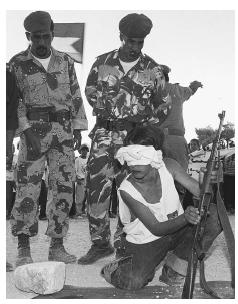Guerilla Warfare
█ MARÍA LÓPEZ
In the modern era, guerilla warfare refers to armed resistance by paramilitary or irregular groups toward an occupying force. Guerilla warfare also describes a set of tactics employed by smaller forces against larger, better equipped, and better supplied forces. Guerilla warfare tactics often rely on isolating smaller units of the larger occupying force so as to attack parts of the larger force by ambush. Guerilla forces often practice espionage, industrial sabotage, and wage propaganda campaigns by portraying themselves as a popular but suppressed political movement. In many areas of the world, guerilla warfare is practiced by local groups against government forces, and is especially effective in areas with a rugged natural topography or areas of dense vegetation (e.g., forest or jungle) that provide natural hiding places from which to stage guerilla operations.
Derived from the Spanish term for "little war," guerilla warfare has a long history. Although the term was not used until Spanish partisans resisted the intrusions of Napoleon during the Peninsular War in the early nineteenth century, American colonist revolutionaries practiced guerilla warfare tactics against British forces to win independence from what was arguably the finest military power in the world at the time. During the twentieth century, communist guerilla forces fought succedfullly against French and then American forces in Vietnam.
Confederate raiders—including Quantrill's raiders (led by William C. Quantrill) and Mosby's raiders (led by John S. Mosby) practiced guerilla warfare against Union forces

during the American Civil War. Following the aquisition of the Philippines after the Spanish-American War, U.S. President Theodore Roosevelt's administration and U.S. forces struggled to suppress Filipino guerilla forces led by Emilio Aguinaldo.
Although usually confined to mountainous or forested terrain, Arab forces inspired by T. E. Lawrence (Lawrence of Arabia) and led by King Faisal al-Husayn used the harsh environment of the desert to fight a successful guerilla war against superior Turkish forces during World War I.
During World War II guerilla forces (also termed "partisan" or "underground" forces) in France and other countries fiercely resisted Nazi occupation.
Well known modern guerilla wars that resulted in permanent changes in government occurred in China, Vietnam, and Cuba. Chinese communist guerillas led by Mao Zedong, prevailed against a number of opponents to eventually take power after WWII. Communist Viet Minh forces led by Ho Chi Minh and later Viet Cong guerilla forces outlasted French and then American forces in Vietnam. In Cuba, Fidel Castro and Ernesto (Che) Guevara fought a three year long guerilla war from 1956 to 1959 that eventually ousted the launched a guerilla war in Cuba against the government of Fulgencio Batista.
Guevara's writings became politically influential for a number of guerilla groups that organized across Central and South America. Guevara wrote that "popular forces can win a war against (an) army" and that "it (was) not necessary to wait until all conditions for making revolution exist; the insurrection can create them."
Other nationalist movements sprung from guerilla movement roots in Algeria (against the French in 1954); Cyprus (Greek nationalists against the British in the late 1950s).
Although often portraying themselves as a popular front, guerilla forces seizing power often engage in bloody "cleansing" and destruction of local populations once loyal to the former government. After seizing power in Cambodia, the Khmer Rouge led by Pol Pot (also known as Soloth Sar) killed an estimated two million Cambodians.
Although sometimes only a matter of semantics, there is often considerable debate concerning the overlap of guerilla tactics with tactics employed by terrorists (e.g., hijacking, kidnapping). There are no easily agreed upon definitional lines to distinguish the two groups. In general, most historians hinge such distinctions not necessarily upon tactics employed, but rather on relations between the opposing parties and the targets selected. Although there are many historical exceptions, terrorists generally represent minority or extreme viewpoints and target civilian, military, or government targets. Guerilla forces generally represent broader popular movements and generally attack occupying military or government forces. A key element in defining guerilla forces as opposed to other types of forces or movements involves the general principle that guerilla forces are generally accepted—in fact often supported and sheltered—by local populations. In accord with international law, in stark contrast to the legal treatment of terrorist groups, guerilla forces are to be treated as combatants in accord with the rules of the Geneva Convention if the forces operate in uniform or carry as distinctive emblem (e.g., patch, red scarf, etc.).
In many cases, whether to declare a particular group a group of freedom fighters, a guerilla force, or a terrorist organization is often a matter of political or geographical perspective.
Cyberspace opens new opportunities and perils for what may come to be considered a new form of guerilla warfare in the twenty-first century as activists (also known as "hacktivists") use Internet technology to combat electronic monitoring and Internet censorship by governments in many parts of the world.
Comment about this article, ask questions, or add new information about this topic: